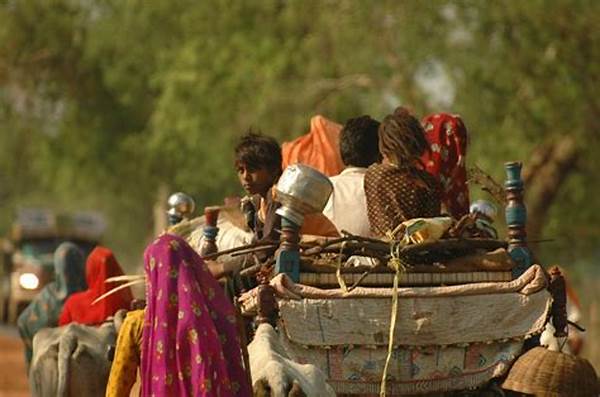The interplay between food security and migration has garnered significant attention in recent years, as global shifts in population dynamics and climate conditions continue to challenge the stability of food systems. This intricate relationship poses important questions for policymakers, researchers, and stakeholders striving to ensure sustainable development. Addressing these complexities requires a comprehensive understanding of the multifaceted factors that drive migration and influence food security.
Read Now : Smart Contracts In Cloud Computing
Impact of Climate Change on Food Security and Migration
Climate change is a critical factor influencing both food security and migration patterns. As temperatures rise and weather patterns become more erratic, agricultural productivity faces significant risks. Crops that once thrived under certain climatic conditions are now struggling, leading to reduced yields and, consequently, food insecurity. Populations heavily dependent on agriculture thus find themselves compelled to migrate in search of better livelihoods. This migration, while sometimes offering temporary relief, can lead to further challenges, such as urban overpopulation and increased pressure on already strained resources. Understanding the role of climate change in shaping these dynamics is vital for developing strategies aimed at enhancing food security and managing migration effectively.
Socio-Economic Factors Driving Food Security and Migration
1. Economic Instability: Economic hardships can exacerbate food insecurity, prompting migration as individuals seek better opportunities elsewhere.
2. Conflict and War: Regions plagued by conflict often experience disrupted agricultural activities, contributing to food insecurity and triggering migration flows.
3. Population Growth: Rapid population growth can strain food resources, leading to heightened food insecurity and migration in search of sustainable living conditions.
4. Political Policies: Government policies, including land reforms and trade regulations, significantly impact food security and can influence people’s decision to migrate.
5. Employment Opportunities: Limited employment in rural areas can drive migration to urban centers, influencing both food security and migration trends.
Policy Responses to Food Security and Migration Challenges
To effectively address the intertwined challenges of food security and migration, policymakers must implement multifaceted strategies. Enhancing agricultural resilience through investment in climate-smart agriculture is crucial. Such initiatives can help mitigate the adverse impacts of climate change on food security. In addition, improving rural infrastructure and access to markets can provide rural populations with viable agricultural livelihoods, reducing the impetus to migrate. Collaborative international efforts are also essential to address transboundary migration issues exacerbated by food insecurity. By integrating migration considerations into food security policies and vice versa, nations can develop comprehensive strategies that foster stability and sustainable development.
Innovative Solutions in Food Security and Migration
1. Sustainable Agriculture: Encouraging sustainable agricultural practices can enhance food security and curb migration prompted by agricultural decline.
2. Technology Adoption: The integration of technology in agriculture increases efficiency, boosts yields, and addresses food insecurity, reducing migration pressure.
3. Education and Training: Providing education on agricultural best practices empowers communities, increasing food security and reducing migration.
4. International Cooperation: Global initiatives can provide support and resources for managing food security and migration challenges.
Read Now : Scenario Analysis For Sustainable Development
5. Climate Adaptation Programs: Tailored programs addressing climate change effects on agriculture can help mitigate food insecurity, decreasing migration drivers.
6. Community Empowerment: Strengthening community resilience through local initiatives can improve food security and curb forced migration.
7. Water Management: Effective water management strategies can enhance agricultural productivity, positively affecting food security and reducing migration.
8. Policy Integration: Comprehensive policies that address both food security and migration can create sustainable solutions for affected regions.
9. Disaster Preparedness: Preparedness programs that mitigate the impact of natural disasters can enhance food security and lessen migration impetus.
10. Investment in Rural Development: Fostering rural development through investment helps ensure food stability and reduces migration pressures.
Global Perspectives on Food Security and Migration
Globally, food security and migration are interconnected issues that require a concerted effort from nations worldwide. As populations grow and climate conditions shift, the pressure on food systems mounts, leading to increased migration flows. Regions with high levels of food insecurity experience significant out-migration as individuals and families seek better opportunities elsewhere. This movement of people can pose challenges, leading to resource strain and increased vulnerabilities in receiving areas. Climate change exacerbates these challenges by disrupting agricultural production and affecting food availability. Thus, international collaboration is paramount in addressing the dual challenges of food security and migration. Effective strategies must take into account the unique economic, social, and environmental contexts of various regions to foster resilience and stability.
Conclusion
In summary, the intricate relationship between food security and migration is shaped by diverse factors, including climate change, economic conditions, and socio-political dynamics. Addressing this issue requires innovative solutions and collaborative efforts to ensure sustainable development. Policymakers and stakeholders must prioritize strategies that enhance agricultural resilience, improve rural livelihoods, and foster international cooperation to effectively manage migration and ensure food security for all. Through integrated and comprehensive approaches, the global community can strive towards achieving a future where food security and migration challenges are managed sustainably, thereby promoting a more equitable and stable world.
